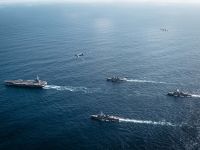Iran’s reformist-dominated Parliament yesterday passed the broad outlines of a law aimed at boosting non-oil exports which have plummeted in the past few years.
The law, which will abolish “various duties” on the exports, was adopted despite the opposition of the economics committee and the reservations of some reformist MPs. Details will be worked out in later readings.
The abolition of the tax will benefit the private sector and traditional traders, who are normally close to the conservatives. The drop in sales of Iran’s five main non-oil exports – carpets, pistachios, chemicals, steel and copper – are worrying the country’s economic officials.
Although non-oil exports were up 6.1 per cent between March 1999 and March 2000, at $3.1 billion they were less than the predicted 4.4 billion.
Exporters at last month’s Tehran carpet fair blamed government for putting obstacles in the way of businessmen and failing to promote their interests.
The carpet sector has been the worst hit by the export collapse in the face of increasing competition from regional countries, led by India and Pakistan. Earnings have dropped from $1.6 billion in 1994, to a current level of little more than $700 million.
Carpet exporters have started eyeing the United States market, since Washington eased its trade restrictions against Iran in March, lifting its ban on the import of carpets, caviar and pistachios. They believe it could be worth up to $100 million a year.
Iran has called for tenders to develop the latest phases of the giant South Pars gas field in the Gulf, press reports said yesterday, quoting the National Iranian Oil Company.
The two tenders cover phases nine and 10, and 11 and 12, with projected total daily output of 105 million cubic meters (3.675 billion cubic feet) of gas and 160,000 barrels of crude oil.
The NIOC said bidders for the buy-back type contracts could be individual firms or consortia.
The first three phases of South Pars have already started production, while Italy’s ENI has won a contract to develop phases four and five estimated at $3.8 billion.
Phases six to eight are in the hands of the British-registered Iranian company Petro-Pars, whose boss Mansur Rezvani said recently that foreign firms could be associated with the venture.
Iran has been seeking to develop its huge gas reserves, the second largest in the world after Russia, to reduce dependence on its oil, its main source of revenue. – AFP
(c) – Agence France Press.








